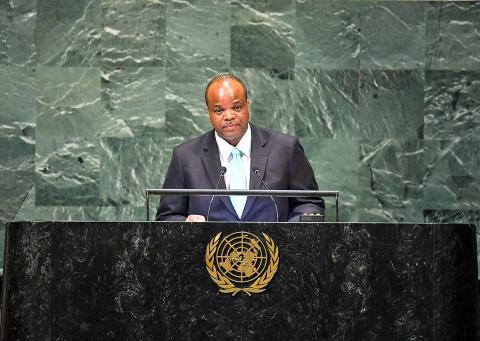Four more of Taiwan’s diplomatic allies on Wednesday spoke in favor of the nation taking part in UN activities, after two did so on Tuesday, the Ministry of Foreign Affairs said yesterday.
King Mswati III of Eswatini reiterated his nation’s “unwavering stance” in calling upon the UN to afford the people of Taiwan the opportunity to partake and contribute to the UN development system.
“Taiwan’s experience in various fields, vital to the dimensions of sustainable development, would go a long way in contributing to the work and membership of the UN,” Mswati said in his address.

Photo: AFP
In line with the spirit of universality, Taiwanese should not be left behind in making the UN relevant to all people, he said.
Kiribati President Taneti Maamau said that the UN theme to be delivered over the next year is about all the people living on this planet.
“This theme will be irrelevant if the UN continues to ignore the 23 million people who live and contribute to our shared home and continues to exclude them from the process,” Maamau said.
“We are one family and we therefore call on an inclusive approach to have Taiwan participate in international processes and to allow it to contribute to address areas of concerns to this UN body and the implementation of the Sustainable Development Goals [SDGs],” he said.
Nauruan President Baron Waqa also said that making the UN relevant to all people must include Taiwanese.
“The people of Taiwan should be treated equally to those of other nations. The UN should resolve the serious issue of Taiwan’s 23 million people being excluded from the UN system,” he said.
Waqa quoted the UN Charter, which says that its mission is to “reaffirm faith in fundamental human rights, in the dignity and worth of the human person, in the equal rights of men and women and of nations large and small.”
Palauan President Tommy Remengesau Jr praised Taiwan as a long-time supporter of his nation’s efforts to achieve the SDGs, through help with infrastructure, and in the health and education sectors.
“We urge the UN to seek a solution to include Taiwan in all its processes, including the International Civil Aviation Organization and the WHO,” he said.
“My government firmly believes that Taiwan’s inclusion in the UN system will greatly benefit the UN’s work and its sustainable development agenda,” he added.

SECURITY: As China is ‘reshaping’ Hong Kong’s population, Taiwan must raise the eligibility threshold for applications from Hong Kongers, Chiu Chui-cheng said When Hong Kong and Macau citizens apply for residency in Taiwan, it would be under a new category that includes a “national security observation period,” Mainland Affairs Council (MAC) Minister Chiu Chui-cheng (邱垂正) said yesterday. President William Lai (賴清德) on March 13 announced 17 strategies to counter China’s aggression toward Taiwan, including incorporating national security considerations into the review process for residency applications from Hong Kong and Macau citizens. The situation in Hong Kong is constantly changing, Chiu said to media yesterday on the sidelines of the Taipei Technology Run hosted by the Taipei Neihu Technology Park Development Association. With

CARROT AND STICK: While unrelenting in its military threats, China attracted nearly 40,000 Taiwanese to over 400 business events last year Nearly 40,000 Taiwanese last year joined industry events in China, such as conferences and trade fairs, supported by the Chinese government, a study showed yesterday, as Beijing ramps up a charm offensive toward Taipei alongside military pressure. China has long taken a carrot-and-stick approach to Taiwan, threatening it with the prospect of military action while reaching out to those it believes are amenable to Beijing’s point of view. Taiwanese security officials are wary of what they see as Beijing’s influence campaigns to sway public opinion after Taipei and Beijing gradually resumed travel links halted by the COVID-19 pandemic, but the scale of

A US Marine Corps regiment equipped with Naval Strike Missiles (NSM) is set to participate in the upcoming Balikatan 25 exercise in the Luzon Strait, marking the system’s first-ever deployment in the Philippines. US and Philippine officials have separately confirmed that the Navy Marine Expeditionary Ship Interdiction System (NMESIS) — the mobile launch platform for the Naval Strike Missile — would take part in the joint exercise. The missiles are being deployed to “a strategic first island chain chokepoint” in the waters between Taiwan proper and the Philippines, US-based Naval News reported. “The Luzon Strait and Bashi Channel represent a critical access

Pope Francis is be laid to rest on Saturday after lying in state for three days in St Peter’s Basilica, where the faithful are expected to flock to pay their respects to history’s first Latin American pontiff. The cardinals met yesterday in the Vatican’s synod hall to chart the next steps before a conclave begins to choose Francis’ successor, as condolences poured in from around the world. According to current norms, the conclave must begin between May 5 and 10. The cardinals set the funeral for Saturday at 10am in St Peter’s Square, to be celebrated by the dean of the College